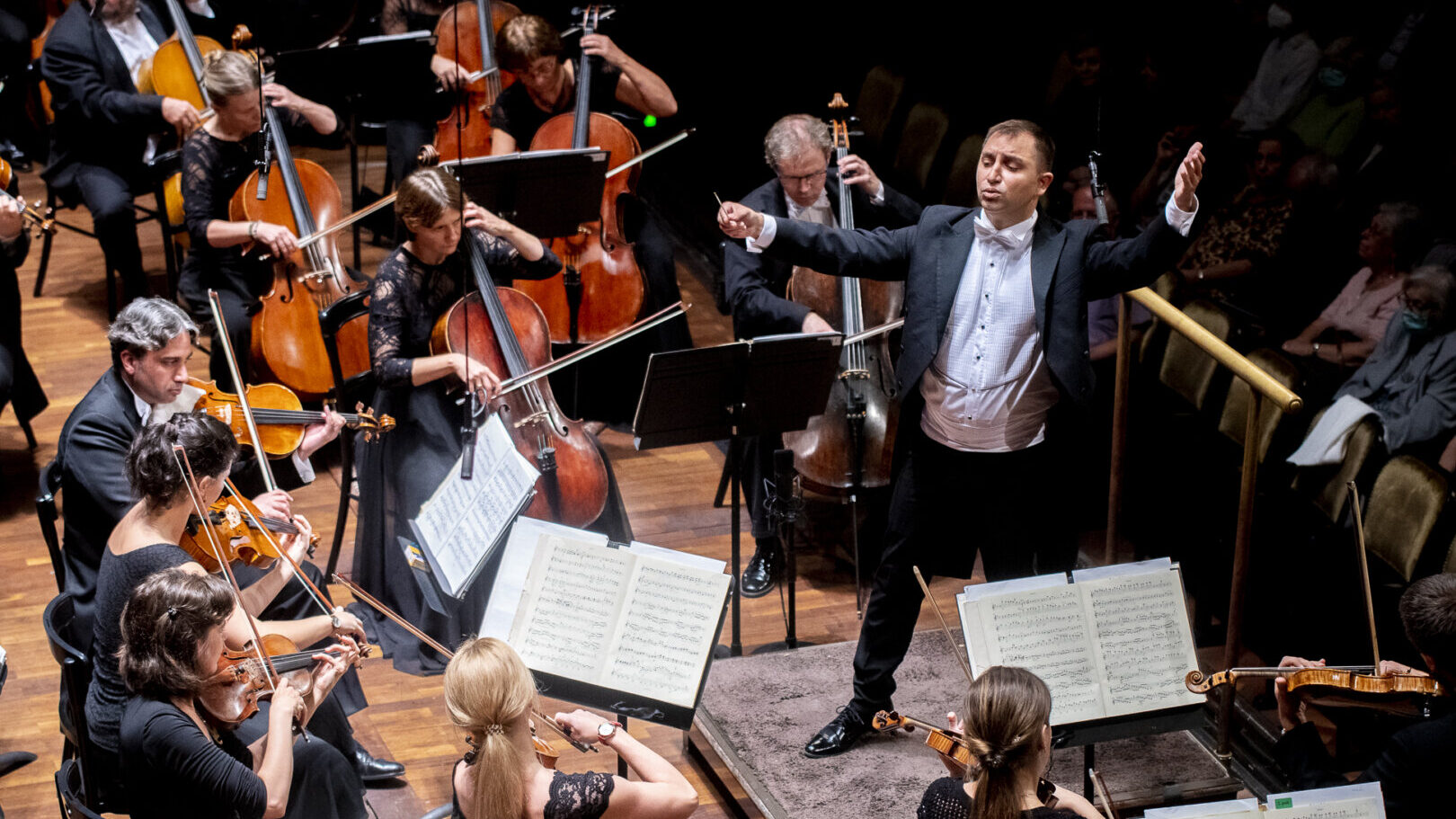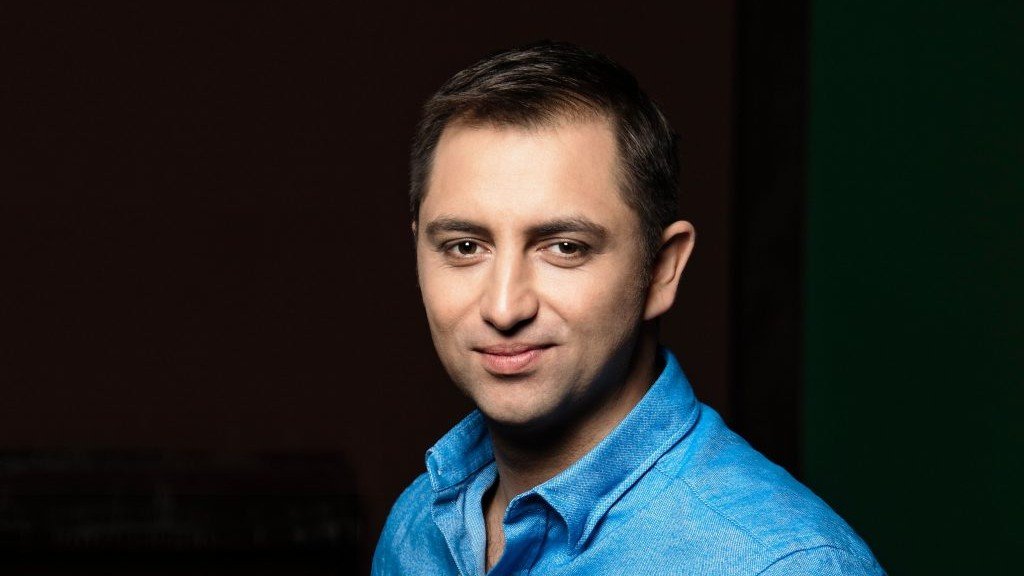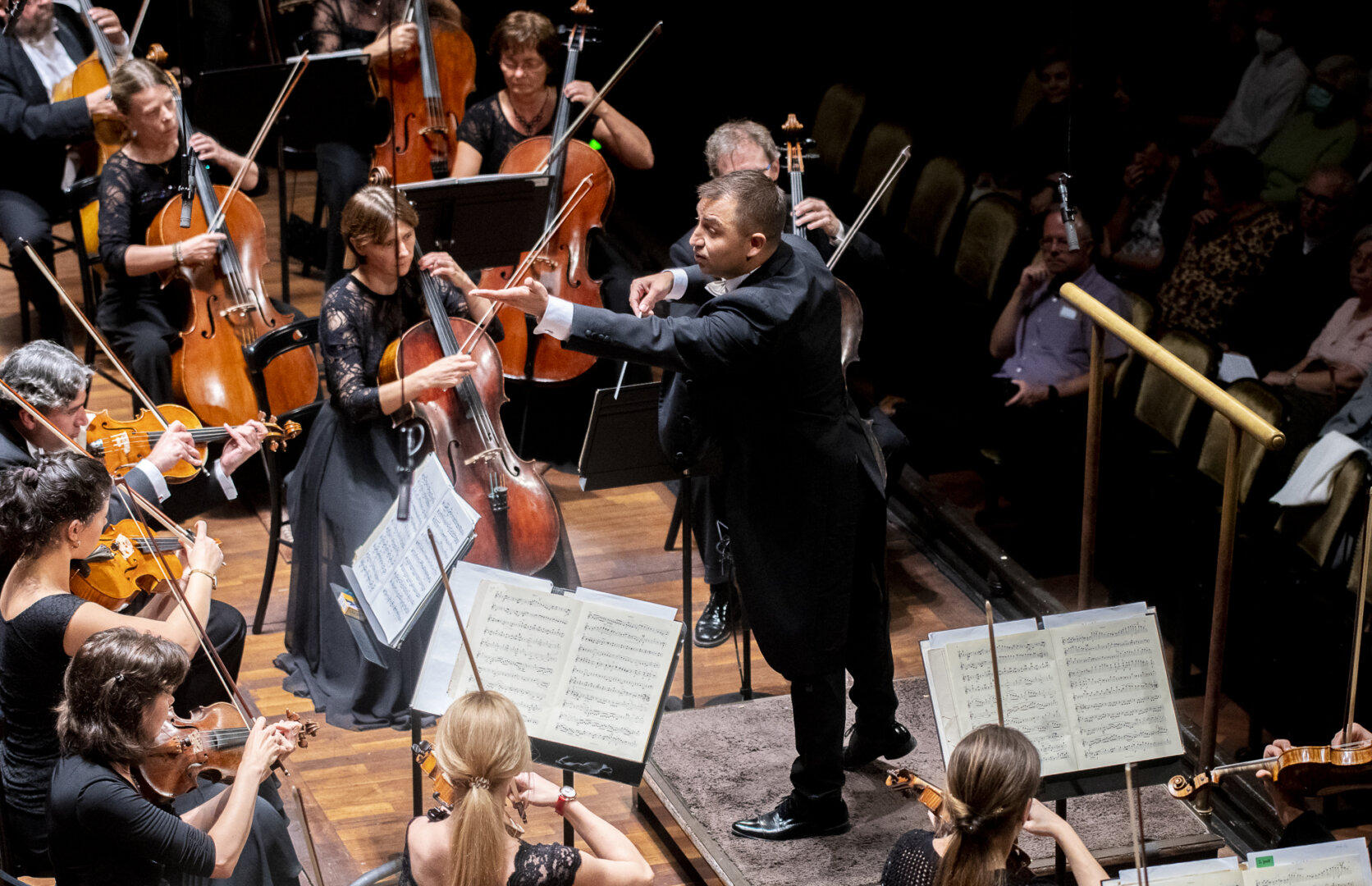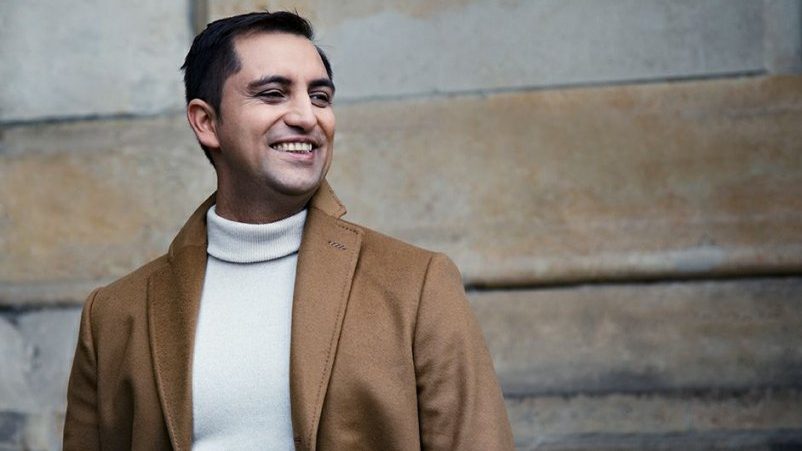Now that he’s just turned 40, conductor Róbert Farkas is ready to take on the world – well, at least the world’s podiums. Since the turn of the new year, he’s already conducted two full concerts and is preparing two more with his MÁV Symphony Orchestra: on 13 January with pianist Sergey Babayan performing Rachmaninov 3, and on 20 January with pianist Alexander Gindyin performing two Liszt concertos. He’s also appearing on a Müpa podium for the Strauss Marathon on 22 January. If this is his usual pace, 2022 is going to be an exciting year for this maestro. I sat down with him for a chat about music, his life, and his dreams.
– I’m very excited about Thursday’s concert with you conducting Sergey Babayan. He’s a god in the piano world and you conducting him in Rach 3 is a tremendous combination!
– I’m excited too because again it’s a jump-in [a last-minute replacement for Gábor Takács-Nagy], and I had just a few days to take over this concert. This month I’ve had two concerts: on the 2nd I conducted a New Year’s concert in the Castle Gardens for Visegrad 4, where we played music from each of the four countries. And on the 9th I conducted a special New Year’s traditional concert of operetta and waltzes at Müpa, organized by the Ferencváros District.
– You’ve worked and studied with so many important musicians in Europe, is it possible to choose who has had the greatest influence on you?
– Yes, I can choose, and although I do have a special person, I want to answer this in a different way. Being a conductor was my last step. The way I got there (beginning at the Liszt Music Academy) was to start studying solfeggio and music theory, combined with learning piano. Learning the theoretical aspects, ear training, and to think in the musical language – all that was fundamentally important.
And then I went to choir conducting. Normally, when you study music and/or a [modern] instrument, you don’t really get exposed to much of the older music, like the Renaissance and early Baroque stuff. At the Liszt Academy, it was very interesting to get to know and actively perform lots of this music with choir. Because I was a choir conductor, of course I had to learn to sing as well, and I must say that my professor, Valér Yóbbágy, gave me great knowledge of old music styles. I had to conduct many choir pieces you don’t hear in the normal concert repertoire, unless you attend a concert of music from earlier centuries. We had to learn this, and it was a very interesting [approach]. There was István Párkai, who was a great influence on me – seeing this wise man working with our choir and how he conducted them. And my piano teacher, Gyöngyi Keveházi, really opened me up to making music freely, while still being very exact on the piano.
The next step was not only choir conducting, but singing in a choir, working with choir and orchestra projects, and singing oratorios. These kinds of activities are the ones that actually opened my eyes to orchestra conducting. The combination of choir and orchestra is the most beautiful thing, I believe. I’m so grateful I now have the possibility to conduct oratorios as well. I have big plans to do lots of work with choir and orchestra – that is such a fulfilling way to bring everything together.

My conducting professor in Berlin, Lutz Kühler, offered other ways for me to learn how to clearly understand the score and the composer, and to figure out what we want to do with the music – to make certain that’s not just [beating time] but how to transform the score when you work with the orchestra. His [pedagogy] was very strong for me while I worked with him at the Akademie der Künste in Berlin. I spent six years at the Liszt Academy and another six years at the Berlin Akademie.
So, probably many conductors start conducting careers earlier than I did, by starting the university already as a conductor. I finished first in Budapest as choir conductor, then went to the second study in Berlin – so 12 years total – that’s why I was 30 when I finished. The professional life starts when you are out, as you start to find your way, going to auditions, doing the Korrepetitor path as I did in Germany, first at the Berlin Staatsoper. There they had a small, experimental workshop stage where I had my very first audition for a position with a project, a comic operetta by Shostakovich, to be pianist and assistant conductor. I got the position, so this became my first opportunity to work with opera singers. Previously, I had accompanied singers in singing classes, pianists with concertos, so many more – all these people were an important influence on me.
After working in opera, slowly I finally came to that very important person, Iván Fischer, who, during my time in Heidelberg where I had my second job as Korrepetitor and conductor, I would visit Berlin from time to time to see my friends, visit rehearsals and see concerts with great conductors. Fischer was one of those conductors – actually he was the only one at this time [for whom] I had a strong feeling that I really must meet. I wanted to know his way of working; his rehearsals impressed me so much that I was imagining how I could meet him. I approached him at one point and he saw that I had some of my PR materials in my hand, so he told me to give it to his assistant. Eight months later, after I had already forgotten about it, I received an invitation. So, I went to the Konzerthaus to do a Mozart project with choirs and orchestras, as his conducting assistant. He was trying me out. There, our work relationship started. Some months later he asked me again, and after we finished the project, I got a new invitation to work with him again with the Konzerthaus Orchestra, and then after the third or fourth time in Berlin, he said: “Now, you have to know my orchestra in Budapest.”
I came back to Budapest, and we started with touring and I was his assistant for many years. It wasn’t a regular position, but only for specific projects, but I feel lucky [to have had that privilege] to work with him, learn from him, and be his “outside ears” in the hall. I learned lots of great repertoire with the Festival Orchestra, and for me it was interesting to go on the tours and see the great concert halls of the world. We toured to China, South Korea, and the U.S.: L.A.’s Hollywood Bowl and New York’s Lincoln Center. [My time with the Festival Orchestra] was like a huge acoustic tourism!
– Is it also possible to pick your favorite era or composer that you favor the most?
– I’m quite open to everything, but as I mentioned, the combination of human voice and orchestra – this is magical. Of course, I really love the Romantic period, and especially the music of Johannes Brahms. His music always touches me. From all of my prior studies starting with the choir pieces of Lassus and Victoria, et al., in his music I can sense this [earlier foundation]. He was, for sure, one of – if not THE – composer who kept the old composition technique and created a new romantic sound world with it. This makes him very special for me. All of his music, especially the choral works with symphony orchestra, are works that I love to conduct.
And I must mention that [maestro] Dmitry Kitayenko was a person who also greatly influenced me. I was assisting him and I really honor him. I love his work, his way of conducting, his clarity – especially with the Russian repertoire. He opened the door for me to learn by preparing some projects for him in Zagreb (where I was conducting the Zagreb Philharmonic). He asked me to prepare the orchestra with Prokofiev, Khatchaturian, lots of great Russian music, for his CD recordings. We did Mahler 8th together there; I was his assistant and I worked with the singers. After this experience, I got other, totally different concert engagements, with the great singer Ute Lemper, a fantastic person – a real stage phenomenon. She could hold her audience in her hands. It was a great opportunity, with the same orchestra and concert hall, but different music altogether.

– What piece of music must you conduct before you die?
– Since singing it in my university choir, the Verdi Requiem is the biggest musical influence in my life so far. So, for sure, the Verdi Requiem. But also, all the Mahler Symphonies!
– Will the concert on the 13th be your first time with Babayan?
– Yes, and it’s my first time with Rachmaninoff’s 3rd piano concerto as well. The Bartók Suite No. 2 on this program will be my first time also. It doesn’t belong to [the cadre of] his well-known pieces. None of my orchestra members knew it! Me neither. It’s an early work: it’s from 1909, Opus 4, and the interesting thing is that this Bartók suite and this piano concerto were composed in the same year. And these are two completely different works. In the Suite we can hear Richard Strauss many times; it’s a real post-romantic sound and often [reminiscent of] “Der Rosenkavalier” where the singing line expresses great feeling – but then in the next bar it’s Bartók again!
– Re: the 20 January concert with the Máv Symphony, you will present a premiere of a new work…
– Yes, it’s called “Mars Mission.” It’s a short piece – only eight minutes – composed by Viktor Molnár for chamber orchestra. It’s an award-winner from a composers’ competition held by Müpa in 2020. I listened to many of them, and somehow the title was so current because in the summer so many things happened through NASA’s Mars project. I only had a midi-file to get a sense of it, so we’re still discovering the true sound ourselves now. This program will also offer two piano concertos by Liszt (performed by Alexander Gingyin), the first of which was what I conducted in my first exam at the Liszt Academy. I really love these great concertos.
– Where do see yourself in five years – not necessarily realistically, but your deepest wish?
– First, of all, if you are a young conductor, most of the [basic] pieces are new, so you’re doing them for the first time. So, I hope in five years, I will have already conducted the most important pieces. I wish also to have the possibility to work continually, not [sporadically] but to have the kind of experience with orchestra and find our [unique] sound – for example, with my MÁV orchestra here – to create our own beautiful warm round sound, to put my own recognizable mark on it. And to reach a point where they intuitively understand my gestures; it’s a process of getting close to each other. Of course, I also want to take steps to conduct more orchestras around the world, especially in Germany.
– How would you describe your experiences in the opera world?
– Opera was a very important ‘school,’ let’s say, for me. To be a Korrepetitor means that you are the one that really knows the piece! You know all the tempos, the changes, you know the singers, you work the most closely with everyone. The first rehearsal they come to you, and you have to study the music, the roles, with them. Then to go through the six weeks of rehearsal with the stage director, so you learn the staging as well, so it’s a very complex knowledge, and a complex way of being involved in the music. It’s a Gesamtkunstwerk, and it’s a big challenge to keep everything together if there are distances between the choir, the singers and you – maybe they don’t see you, etc. You have to be very exact and very sure about what you do. What I learned from opera, because my main position was Korrepetitor with conducting obligations (as I was not one of the main conductors), when I had to conduct performances, it was without rehearsal. Once you give the downbeat – no matter what happens – you have to finish without stopping, which is radically different from the rehearsal process. This is what helped me a lot – not to be afraid of jumping into other projects.
I remember my first jump-in: when Zoltan Kocsis had just died, I conducted his program here with the Hungarian National Philharmonic Orchestra in Budapest. I soon went back to Berlin, and sometime after midnight I got a call from the National Philharmonic Orchestra, on tour in Warsaw. Their conductor was in the hospital, and could I take the first plane to Warsaw to conduct the Bartók Concerto for Orchestra and a Liszt piano concerto that evening? I had only conducted the Bartók in Péter Eötvös’ masterclasses and had assisted it with Fischer in the past. But I had no time to be nervous. I did it and it was fine. THEN, I admitted it was my first time on the podium for those pieces! Thanks to all my opera conducting, you know that once you start, you have to finish.
– What are some of your non-musical influences?
– My friends, but also it has something to do with music, but it’s a scene: the underground electronic music world. Trance music in open-air parties, close to nature, at a lake or in the mountains or the forest. I love those big festivals, but being connected with people is the real reason. I’m very human-centered. I’m always interested in people, talking to them – with the German language it was easy, but in my 20s I had never learned to speak English. I learned it by speaking to my friends in Berlin, who were all speaking English. That was confusing to me; why, in Berlin? So, I listened and learned. My flat-mate was from Serbia and only spoke English, while I only spoke German. It was slow, but after two or three months, we were speaking English with each other.
Hungarian poetry and literature have been a profound influence on me too. I quote Vörösmarty in my MÁV statement: “There will be a celebration on earth, and when the bells of this tragic time get tired and all problems will die on the field of war, then start to play the violin again, and the gods will find their pleasure in it.”
– Something more personal: is your family musical or are you the only musician in it?
– Yes, I was born in Ózd, but I grew up in Heves, in the eastern part of Hungary, where my father is from. We’re a gypsy family and I’m the only musician. Education there was not a common [expectation]; my parents were young parents, and I have two brothers. Somehow, the [need for] education was not in the family. I had some musician relatives but I didn’t really know them. They played in the gypsy orchestra in Budapest, what we called Rajkó. I grew up with the gypsy musical folklore that everyone played around me – the guitar, singing, with two spoons and a water can for rhythm. Singing and dancing is what was normal and what gave me my love for music, and making this folkloric music together.
– At this point in your continental career in classical music, does your family understand you?
– Yes, they do. But if you go abroad, like to Germany, for example, when people see me, they think I am from India, or Guatemala, or South America, Spain, whatever…or Arabic, but nobody asked me if I was a gypsy guy. It’s not as clear there, as it is in Hungary where gypsies are 10% of the population. That’s why I never had this kind of racism here that I’ve met abroad. As my European friends and I would be talking, they would say “You don’t look like a typical Hungarian.” I would say: “That’s because I’m not a typical Hungarian. I have a gypsy background.” Somehow in the West, people have this legendary way of thinking about gypsies: they thought we have horses and we have the coach behind us, and are always on our way somewhere – wandering. They ask: “Are you still wandering with your family?” I would say, “No, I never did that. We have a fixed house and a life…it was so fascinating that they had no idea…I thought it was funny that that question came up so many times. And they don’t really know what [being a gypsy] means – they think we are living in the forest!

One time, my assistant, a wonderful vocal coach in an opera project, and I were actually walking in the forest because the project was next to the forest. We were talking about the subject of ethnic backgrounds and, at one point, she told me a story about her father – that he told her he had met gypsies in the forest. She found this very interesting, so I told her I’m a gypsy guy, and you’re meeting me in the forest!
You know, I have always thought: you are a human, and don’t think about race. Even with my family I always had this feeling, like, be human, and if you are a good man and you do your job and do it well, then it won’t be a problem. People will be surprised and [start thinking in another way]. It’s not typical elsewhere, but in the music world we are many – there are gypsy musicians everywhere. We have this extremely big desire to play music. Personally, I never had this problem to try to convince others about me and my knowledge – I just do my stuff. Good and bad people are everywhere, but I just stick with the ones who accept me. This thinking has been with me all my life: just be human, be open to the world, never be against anyone…we are one. The world must be one, we must live together, and this is why I never understand any problems which start with racism. Human love must be the thing that has the power to connect us all.
– What is an interview question that nobody has asked you, and you wish they would?
– Ha-ha, maybe “Will you marry me?”











